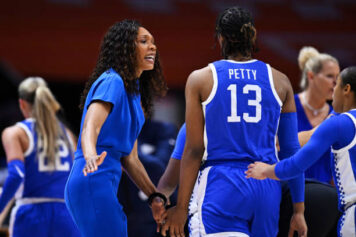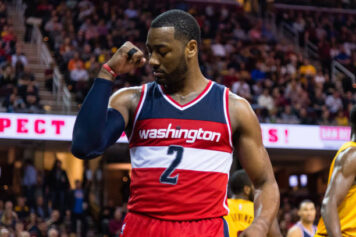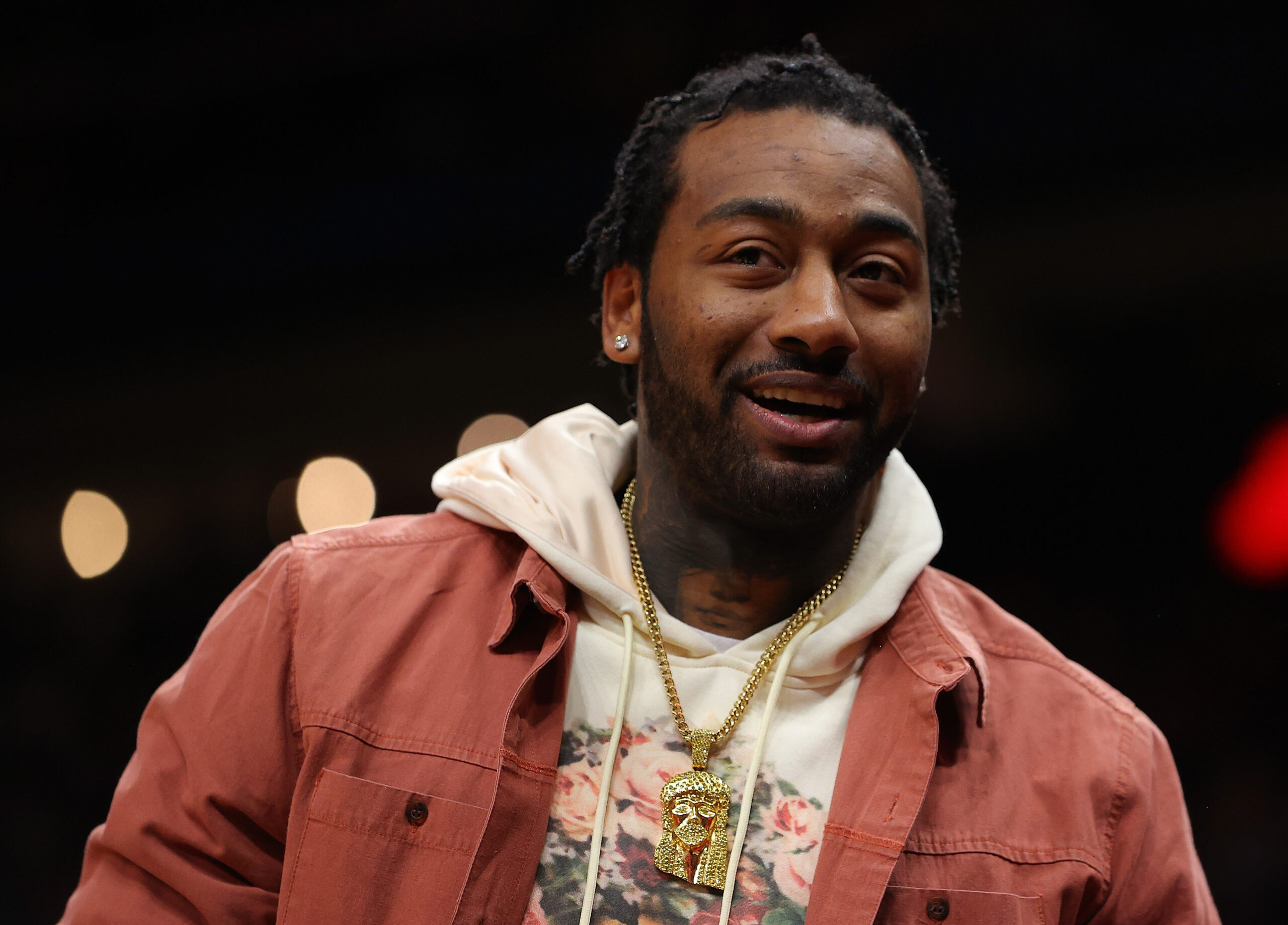“From the guys who have been in the league for a while and don’t get talked about to the new guys that really haven’t had anything good said about them lately, a lot of people don’t give us recognition. I know that’s how it goes. You win; people love you. You don’t, they got somethin’ to say about you…So be it.”
— John Wall , Washington Wizards point guard
**********
The greatest and the worst thing that happened to John Wall's basketball career are those highlights. Those damn YouTube highlights, you know the ones. The ones that provided the media the visions of athletic grandeur to question whether Wall might jump to the NBA out of high school via court ruling. The highlights that prompted experts to say that he could've gone No. 1 in the draft in 2010 and 2009, over Blake Griffin.
But see, that's the problem with highlights. They don't talk about percentages from the 3 or free throws made–they only show the good stuff. They're crack for the pumpkin-deprived.
Let's look at what this is really about, though. Wall has been a future NBA franchise player before his future in the league even arrived. It’s been four years since that sentiment was first uttered. It’s not necessarily anyone’s fault. It’s not a condemnation, but whether he is or is not depends entirely on the ascertainable talent potential of Wall and the franchise he’s playing for. It's context.
Promise and failure. Deprivation and potential. What are these ideas really about with Wall?
It’s widely presumed that the Wall narrative is about pressure. In all honesty, the pressure is as low as it’s ever been. The pressurized expectations of Wall ascending to the heavens and making Washington a new dynasty are practically vapor.
Wall had a disappointing second year, where he was criticized for being too inefficient as a point guard, too fast to play smart, and too gun-happy to actually make the Wizards play well. He’s missed so much of his third year already; there aren’t any All-Star aspirations. The playoffs are virtually out of range, and he’s trying to make sure he can recover fully and get up to speed.
Pressure is nothing but a word in the here and now.
The pressure was there when he was destroying people at the rim wearing purple and gold as a prepster. The pressure was there when he went to Kentucky and was within two games of winning a national championship. The pressure was there when he was drafted as the first man in the NBA Draft and a shoe company gave him $25 million to be an “aspirational” star.
Pressure was, at one time, just trying to grow up and survive.
No, doubt is the source of the lost confidence present in the current Wall narrative–but doubt isn’t radiating from the 6’4”, 195 lb. PG. It’s coming from the crowds, the fans, the observers, from brands. The light of fame doesn’t always shine in the prettiest places and the doubt isn’t hard to see when the spotlight is shown in the wrong places.
Colin Cowherd flashed some light on his radio show, saying Wall was destined to fail and stopped just short of calling him a cretin and buffoon–after his first NBA home game.
Or, when former Orlando Magic head coach Stan Van Gundy said:
“He’s certainly got talent, but I don’t know that even John Wall is a great player to build your franchise around. I don’t know WHO you’re building around, so it’s tough to even think about what the construction of your team is. That’s just a bad basketball team.
“I think maybe they thought it was gonna be John Wall, maybe they still think it is. I think there’s a lot of people in the league … I’d certainly be one that would share this opinion: I don’t think John Wall’s good enough to be the guy that you build around. I think he’s got great speed and quickness, but point guard is a decision-making position. That’s what makes you great as a point guard, is your decision-making. I haven’t seen any indication that John Wall is a great decision-maker.”
**********
Take a glance at what made up the Wizards’ roster when Wall came in the league for his rookie year: former All-Stars looking for minutes, D-League players looking for opportunities to shine bright, disgruntled veterans traded to a team with no reasonable opportunity to win, no discernible mentors to help Wall be better, and a head coach who signed on to coach a team that was first in the Eastern Conference four years before.
Was a broken and confidence-less Gilbert Arenas gonna get it done? A double-zero-wearing Mike Bibby waiting to get back on Miami’s bench? Josh Howard with a bum knee or an impotent shooting contribution from Rashard Lewis?
Year number two was more of the same.
And in his third season, after Wall has finally returned from a half-season of healing from a knee injury? The Washington Post’s Mike Wise sets it up beautifully (from mid-January):
In their first 32 games, the Washington Wizards were 4-28. In the past seven games, they are 5-2. Just in the past two weeks, it’s pretty clear what they’ve been missing so badly this season.
You can blame Wall, but it’s not just about him. Winning isn’t just about the star, it’s about who the star is passing the rock to. No disrespect, but were there double-teams coming for Morris Almond and Trevor Booker last year? Shelvin Mack and Cartier Martin? Ronny Turiaf or Jan Vesely?
Fellow Shadow Leaguer J.R.Gamble laid it all out about the young Wizard’s journey and his tribulations:
Wall’s a special talent who was unfortunately abducted by one of the NBA’s junkyards. Washington is a pathetic nursery school for ballers. Wall is only 22 and hasn’t been mentored like the greats must be. Magic had Kareem, Rondo had The Big Three and Biggie had Diddy. Wall hasn’t been taught the nuances of the game, the cost of victory. Surround a healthy Wall with some winners and you’ll see his upside.
If you’re gonna blame Wall, maybe blame the Wizards for a lack of guidance, too.
Also consider Reebok’s role in anointing Wall as a virtual savior of the brand’s basketball division, a sector of the Vector that progressively sunk to lows after Allen Iverson slowly dissolved from the present-day basketball zeitgeist and Steve “Stevie Franchise” Francis flew away from the league like a tay in the win’.
Before Wall even stepped foot on an NBA court for a regulation game, Reebok showed the still inactive, defiantly unretired Iverson crossing-over away from Wall’s path and passing him the rock to shoot Reebok’s shot – how clear is that for a bold statement? Was Wall even worthy of that display in the first place?
**********
“You get noticed by winning. That’s all I want to do is come back and improve and I think I’m doing that and having a mature game after sitting out so long and know what’s going on. My team is winning now, and that’s all I care about …
“At first I was hyped then it goes away. There’s a lot of good point guards in this league and I’m just trying to keep getting better to be up there with the best.”
–Wall (via The Washington Post )
**********
The numbers say it all about what Washington is and isn’t when Wall isn’t suited up for play. Without No. 2, Washington goes 5-28, shooting 40.9% from the floor with 20.9 assists, and letting opponents outscore them with 96.8 to 89.4. With Wall, Chocolate City goes 6-3 and shooting 47% from the field with 24.4% assists as a unit, all the while outscoring their opponents 99.1 to 92.4.
The former Kentucky Wildcat is doing not-so-slight work with a young, castaway crew.
Still, the jury’s out on just what Wall is and what he’s going to be, but if he’s going to be a superstar, a franchise player, the once-in-a-decade kind of player that he was long scouted as, the ball is in his court.
What’s clear is that the doubt that’s levied against Wall isn’t abuse of self–it’s a stoning of the player from lookers-on. There’s a judgment of Wall’s potential not yet realized, but timing means everything, so judge accordingly.
Just make sure that when you judge him for whatever is and shall be, that you check out who owns the 92 feet he plays on.



